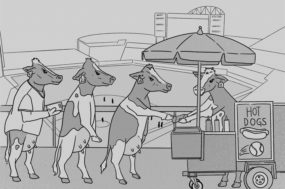While your financials still rule when a banker evaluates your farming operation for continued financial support, there are other equally important factors successful dairy producers should know about.
When you borrow money, you are putting your business on the line by pledging your business assets to secure the loan. Don’t let not knowing something about the terms, conditions or any other expectations by the banker put your business at risk because you fear sounding dumb if you ask questions. Never hesitate to ask questions. Bankers and their customers often talk past each other because the language used by bankers is often not well understood by producers. Any banker worth his or her salt will gladly answer your questions. If you get the feeling that your banker isn’t willing to level with you, it might be time to find a new banker. Asking questions helps to confirm your commitment to your business; it is not seen as a weakness by your banker.
All farm loans must meet several numerical tests in order to be considered “bankable” (a term that means being able to get credit or not). There are three things that all bankers look at when they evaluate your financials.
The business has to have adequate liquidity. Liquidity is how well the business can cover current debts with available cash or readily sold stuff on hand. The need for improved liquidity is a prime reason to borrow in this current environment.
In order to borrow, your stuff has to be worth more than you owe on it. This is called solvency. You have to have a positive net worth (or you are “underwater”). How much is enough in order to be able to borrow more money from a bank? In most cases, your stuff has to be worth about twice the amount you owe and want to borrow.
Adequate repayment capacity. Can you make the payments with a margin left over for other needs? This is the problem many producers find themselves in right now. Many farms have a lot of solvency, but are weak on liquidity, thus killing their repayment capacity. The good times in the dairy industry earlier this decade led farmers into a liquidity trap – plenty of stuff is owned, but not enough cash is being generated to pay debts owed. To successfully borrow money, you have to demonstrate you can make the payments. This is where your banker can be of tremendous help to you. Your banker may be able to restructure your payments to lower them. When your banker is talking about your ability to repay a loan, lean in and listen very carefully.
While analysis ratios at an individual institution will vary, these are the primary credit-making considerations in any credit request. You have to be able to demonstrate that you can meet these hurdles. Getting your banker on your side and enlisting his or her help to become your advocate within the bank is the subtle part of borrowing money which many producers fail.
What does my banker want to know? Having a basic understanding of the credit-making process inside a bank can be enormously beneficial to a producer. An improved understanding should begin with this fact: bankers want to help their customers succeed. Bankers who succeed at helping their customers are, in turn, successful bankers. Help your banker be successful by helping them get the information they need to get your credit request approved. Acting hostile or going silent will not help you in any way. Trying to hide information or assets is just stupid, and it could make the difference between you getting the credit you need or not.
Bankers often make site visits. Why? There are many reasons why bankers make site visits, and you should ask them what the purpose of a particular visit is before the visit occurs. Once you understand the purpose of the visit, use it as an opportunity to showcase your operation. Make sure you have a list of significant improvements you have made to your farm. Take the opportunity to educate the banker about some aspect of your operation that is unique. Keep the meeting brief and focused. If your banker is looking for specific information, for example how many milking cows you have, help him or her get that information as quickly and efficiently as possible.
Keep in mind, bankers are constantly evaluating the situation and they depend heavily on what they observe when they are on your farm. Knowing this can be very helpful to you. For example, don’t berate employees in front of your banker. Demonstrate to the banker that your employees are satisfied members of your operation’s team. Turn the cellphone off. If information was requested before the site visit by the banker, have it ready to hand to your banker. Bankers don’t ask for stuff for fun – if he or she is asking you for something, it is important and might be critical to your success at getting the loan.
Once the banker has gotten all of the information they need from you, you should know that now the banker’s task is to “sell” the idea of lending you more money within the bank. If you think your banker is tough on you, you should know that selling the idea of extending more credit to a customer during tough times is a very difficult task for the banker within their institution. Now your banker is acting as your advocate among people who you have probably never met and who know almost nothing about you or your farm. At this point, everything depends on your financials, and the story your banker has developed about you based on his or her experiences working with you. How do you want that story to sound?
You have a tremendous opportunity to help your banker make the decision to go with your credit request or not, even in this terrible dairy economy. Having solid financial statements is important, but successful producers also understand there are many other important aspects to borrowing money, and thankfully they depend on human interactions. Like any lifelong relationship, working with your banker is a long-term project that depends upon mutual trust and respect. ![]()

-
John Blanchfield
- Owner
- Agricultural Banking
- Advisory Services
- Email John Blanchfield







